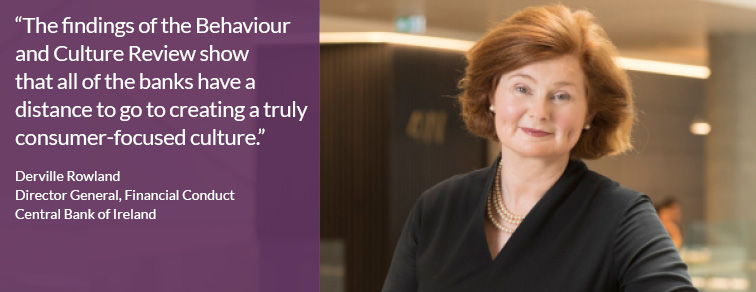Behaviour and Culture Report into Irish retail banks published
 The Central Bank of Ireland has published a report assessing the culture and behaviour of the main retail banks operating in the Republic of Ireland.
The Central Bank of Ireland has published a report assessing the culture and behaviour of the main retail banks operating in the Republic of Ireland.
Titled: “Behaviour and Culture of the Irish Retail Banks”, the Report was undertaken in collaboration with the Dutch Central Bank (De Nederlandsche Bank – DNB), leaders in the supervision of behaviour and culture).
Culture is important from a prudential and conduct perspective, given that behaviours can affect any or all areas of a firm. The Central Bank expects banks to act in their customers’ best interests in tandem with fulfilling their prudential obligations.
The Report comprises the outcome of a series of Behaviour and Culture Reviews undertaken at the five main Irish retail banks – AIB Group, Bank of Ireland Group, permanent tsb, Ulster Bank Ireland and KBC Bank Ireland.
The reviews focused primarily on the behaviour of executive leadership teams of each bank as well as the interplay of senior executives and internal stakeholders in the context of strategic decision-making. As such, they represent a snapshot at a point in time with a particular focus on the key decision-makers in each firm who set the tone from the top.
Reflecting the importance of diversity and inclusion to an organisation’s culture, the Report also includes separate Diversity and Inclusion Assessments of the five banks.
Summary of findings
The Report finds that while all banks have taken steps to reinforce the consideration of the consumer interest, some are more advanced in their transformation than others.
Specifically, two important prerequisites for successful transformation were not met in all instances. These are:
- A collective understanding of what consumer focus means and what behaviour it requires.
- An embedded consumer focus in structures, processes and systems.
The Report also highlights the following issues that may jeopardise the successful transformation towards a consumer-focused culture:
- Several executive committees display “firefighting behaviour”, focussing on urgent and short-term issues thereby hampering their capacity to design a long-term cultural transformation process.
- Some banks continue to display remnants of the crisis-era mindset resulting in occasional reversal to directive, or ‘command and control’, leadership styles when the emphasis should be on collaborative approaches.
- There is a need to increase empowerment and decision-making ability of senior staff, in order to decrease executives’ decision burden and enable the organisation to execute the transformation.
- The Report finds concerns around over-optimism regarding the successful transition to a consumer-focused culture.
- The Diversity and Inclusion Assessments reveal banks have more work to do to ensure their organisations are sufficiently diverse and inclusive.
Commenting on the findings of the Report, Derville Rowland, Director General Financial Conduct, said:
“Culture is set from the top down. It is a matter for boards and senior management, in the first instance, to set an effective culture that places the best interests of their customers first. Banks still have a distance to go to live up to their slogans of putting customers first.
“Effective organisational culture builds on shared purpose and standards such as professionalism, honesty, integrity and accountability to deliver fair outcomes that have the interests of consumers at heart. The Central Bank expects to see such standards and values embedded in all the firms we regulate.
“That is why we have been increasingly insisting that firms comply not only with our regulations and codes, but also that the people who lead those firms set about building a culture that serves their customers, their shareholders and the wider economy in which we license them to operate. And where culture is deficient and causes risks to consumers, we will require banks to mitigate those risks.”
Next steps
The Report contains the following actions and recommendations:
- Banks will each be issued a Risk Mitigation Programme, requiring them to devise action plans in response to the institution-specific findings of the Behaviour and Culture Reviews. Supervisors will assess the actions planned by the banks and engage on progress being made.
- Banks will be required to respond to the Diversity and Inclusion findings by providing the Central Bank with a separate action plan to increase diversity and inclusion
- The Central Bank proposes the introduction of a new Individual Accountability Framework which would apply to banks and other regulated financial service providers. The Framework includes Conduct Standards for regulated financial services providers and the staff working in them, a Senior Executive Accountability Regime as well enhancements to the existing Fitness & Probity Regime and enforcement process.
The Central Bank will also use the findings of the Report to inform our ongoing supervisory work in relation to the five banks. We will also conduct more frequent, targeted conduct supervision of those firms that pose the greatest potential harm to consumers, including robust challenge of boards and executive management.
The publication of the Report follows a request from the Minister for Finance in October 2017 that the Central Bank examine the cultures and behaviours in Irish retail banks.
This request was made in light of the ongoing Tracker Mortgage Examination which has exposed significant cultural failings within Ireland’s banking sector.
The Minister mandated the Central Bank to report on the following:
- Current cultures and behaviours in the retail banks today
- Risks associated with these cultures and behaviours
- Actions that may be taken to ensure that lenders prioritise customer interests in the future.
To prepare the Report the Central Bank worked in close collaboration with the DNB, who are recognised leaders in the supervision of behaviour and culture of financial firms.
The Reviews used a combined methodology including elements of the Central Bank’s Consumer Protection Risk Assessment model and DNB’s behaviour and culture methodology.
See also: